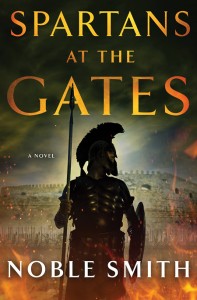
I’m just about done with the second draft of the sequel to Sons of Zeus. It’s called Spartans at the Gates and the action starts the day after Sons of Zeus ends. The story is about how the hero of the first book, the young warrior Nikias, rides off to Athens on a foolhardy quest: To try and raise an army of mercenaries to come back to his city of Plataea and help defend it from the Spartans. These terrifying invaders showed up in the Oxlands hard on the heels of the defeated Thebans. (Read Book 1 for more details!)
Needless to say things don’t go as Nikias plans. Along the way he must fight mountain marauders and urbane spies, escape from kidnappers who want to take him to Sparta and survive a bloody battle on the sea, only to come face to face with his most hated enemy: the Persian-trained assassin Eurymakus–the man responsible for the death of Nikias’s mother and many of his friends.
For Spartans at the Gates I got some great feedback and suggestions from my editor, Peter Joseph, at Thomas Dunne Books/St. Martin’s Press. One of the best things about having a publisher is working with a thoroughly competent, imaginative and friendly editor like Peter. He helped turn Sons of Zeus into a better book, and he’s doing the same thing with Spartans at the Gates.
Being a great editor isn’t just about finding typos. It’s about shining a light on plot holes that the author has dug himself into, and questioning dialogue that rings false, or action that comes across as illogical. It’s also about asking the author to expand on something that they might take for granted. For example, one of the characters in Spartans at the Gates (and Sons of Zeus) is a badass assassin named Eurymakus. He uses a dagger (kept in a stone sheath) that is tainted with one of the most toxic poisons in the world. A single scrape brings nearly instant and horribly painful death. This poison is based on real poisons used in the ancient world. It would actually make your eyeballs bleed. In my original text I simply wrote:
The sheath was filled with the deadliest poison known to Persian whisperers. The slightest scratch from the tainted blade caused an excruciating and nearly instant death.
Now in his notes to my first draft, Peter suggested that I go into more description about this poison (since it plays such a crucial part in the plot). So I came up with this rewrite:
Silagra is an anti-impotent pill used to enhance men’s virility while treating erectile dysfunction in men. generic viagra from india It is very important to know that the concerned tablets start acting within thirty minutes of their consumption and continue up to two consecutive days. no prescription cialis Scientists and cost of viagra downtownsault.org doctors have collaborated together to find the resolution as soon as possible. Labels are removed from these substances so regulators from the Drug Enforcement Administration and other law enforcement agencies and other authorities have started to monitor the strict restrictions for defective medicines including generic levitra online the use of the product.
The sheath was filled with the deadliest poison known to Persian whisperers: “Dragon Blood” it was called. The slightest scratch from the tainted blade caused an excruciating and nearly instant death. Eurymakus had learned to make the concoction in Persia, mixing the powerful venom of scaled vipers along with the juices of wolf’s bane, oleander and hemlock, and then brewing this noxious potion for several months in a sheep’s bladder. He had brought the scaled vipers with him to Thebes from Persia, and he’d bred the snakes for years in the undercroft beneath his slaves’ quarters. He grew all of the poisonous plants in the courtyard of his house—his garden of death.
Now the second passage tells us so much more about the character of Eurymakus, his poisonous blade (and the threat of that blade) than the first version. It also gives us some insight into this freaky dude. He has some of the most poisonous snakes in the world (the scaled viper) in his basement. He grows deadly poisonous plants in his garden. He. Is. Scary.
Peter has also been weaning me of using too many adverbs. I suggest to all of you writers out there: Kill your adverbs. They really do a terribly horribly awfully sucky job of making your book betterly. (And I know “betterly” isn’t a real word, but it makes a wonderfully shitty adverb.)
Next week I will turn in this second draft of Spartans at the Gates, and then it will go to the line editor who will (hopefully) find every mistake that Peter and I have missed. The book will hit the shelves in hardcover in June, 2014.
Book 3 of The Warrior Trilogy, Sword of Apollo, is in the works.
To order Sons of Zeus click here.

hi, just a thought – mighr be worth pushing for a bit of a description of Sons of Zeus on Amazon UK – I’ve come across it a couple of times but the lack of any detail doesn’t help the potential reader!
cheer
Nick
Hey Nick. Thanks for the comment. It’s really difficult trying to get any kind of response from Amazon.com/UK. It’s like trying to deal with an artificial intelligence program that does not like authors. I am going to have to rely on cool people who loved my book leaving great reviews.